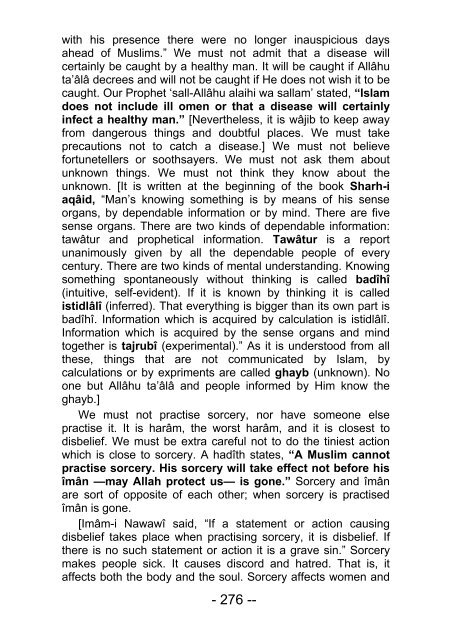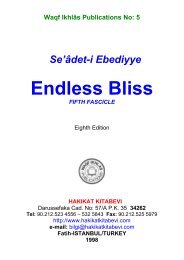- Page 1 and 2:
Waqf Ikhlâs Publications No: 3 Se
- Page 3 and 4:
ENDLESS BLISS CONTENTS OF THE THIRD
- Page 5 and 6:
To attain the honour of the true d
- Page 7 and 8:
harâm to say the Basmala when begi
- Page 9 and 10:
the things that are necessary for t
- Page 11 and 12:
have no other choice but to believe
- Page 13 and 14:
All of what Hadrat Muhammad has inf
- Page 15 and 16:
and believing. There is not scarcit
- Page 17 and 18:
Muhammad! It will happen as Allâhu
- Page 19 and 20:
who died in 958 [A.D. 1551]. It has
- Page 21 and 22:
son of Nûh (Noah) ‘alaihissalâm
- Page 23 and 24:
us out of this world as we are toge
- Page 25 and 26:
sin, nor does He fear anything. The
- Page 27 and 28:
doings of theirs are bad and realiz
- Page 29 and 30:
the benefit of all people. Trying t
- Page 31 and 32:
Him.] He forgets all creatures. He
- Page 33 and 34:
the blessing was not completed, the
- Page 35 and 36:
from your life, the time of death i
- Page 37 and 38:
torment in the grave is like the to
- Page 39 and 40:
“He created the earth in two days
- Page 41 and 42:
the same token, we have been so hap
- Page 43 and 44:
alive. Therefore, those dead people
- Page 45 and 46:
into the heart of a slave of His an
- Page 47 and 48:
your time by reading the Qur’ân,
- Page 49 and 50:
accordance with their own mental ca
- Page 51 and 52:
3 — ASH’HADU ANNA MUHAMMADAN RA
- Page 53 and 54:
alaihi wa sallam’ declares in a h
- Page 55 and 56:
as he dies. He who does not perform
- Page 57 and 58:
Kitâb-ul-fiqh-alal-madhâhib-il-ar
- Page 59 and 60:
1 — The angels of torment which w
- Page 61 and 62:
3 — Those pieces of information w
- Page 63 and 64:
Kamâl, Halabî, Bâqânî, say,
- Page 65 and 66:
fingers should be bent inform that
- Page 67 and 68:
make the sign. The fatwâ also agre
- Page 69 and 70:
should do one’s best to perform i
- Page 71 and 72:
else is a sin graver than drinking
- Page 73 and 74:
declared: “He who resuscitates an
- Page 75 and 76:
offensive words? A signal would do
- Page 77 and 78:
upon these great people. And they b
- Page 79 and 80:
fighting army. Leaving the means be
- Page 81 and 82:
likes! May He bestow safety upon yo
- Page 83 and 84:
trouble given to them by others the
- Page 85 and 86:
[It is written in Tafsîr-i Mazhar
- Page 87 and 88:
fudûl. For, the mubâhs more than
- Page 89 and 90:
of repentance, a great blessing. If
- Page 91 and 92:
salâms to all Believers and prays
- Page 93 and 94:
permissible and necessary.] It is c
- Page 95 and 96:
for them. They will stay in Paradis
- Page 97 and 98:
people after prophets. Thus, it wil
- Page 99 and 100:
desire for the caliphate; why shoul
- Page 101 and 102:
’Umar, ’Uthmân, ’Alî, Talha
- Page 103 and 104:
Mawâhib-i ladunniyya states: “Ib
- Page 105 and 106:
asely. Hadrat Alî had reached the
- Page 107 and 108:
emembered in good terms. This means
- Page 109 and 110:
they began cruelly to slander the U
- Page 111 and 112:
Islam and to help the Master of Pro
- Page 113 and 114:
longer be any reason for their slan
- Page 115 and 116:
Beloved’s wish, with which their
- Page 117 and 118:
ones should be given many troubles
- Page 119 and 120:
prophet, angels would come to him,
- Page 121 and 122:
has based the universe on ’adam.
- Page 123 and 124:
answer it some other time. I have w
- Page 125 and 126:
the fact is clearly stated in the Q
- Page 127 and 128:
they do not exist, but they have to
- Page 129 and 130:
human beings, that they enter discu
- Page 131 and 132:
looks at him all the time, the geni
- Page 133 and 134:
acquainted with genies, served the
- Page 135 and 136:
ook has also been appended to the b
- Page 137 and 138:
‘rahmatullâhi ’aleyh’. It ex
- Page 139 and 140:
As it is seen, from that time till
- Page 141 and 142:
into the clay.” You ask what he m
- Page 143 and 144:
wattaslîmât’, for they have inv
- Page 145 and 146:
presumption. It is harâm for a per
- Page 147 and 148:
the word “Hasbiyallah.” Therefo
- Page 149 and 150:
walnut, yet, when compared to the o
- Page 151 and 152:
no thinking here, the closing of th
- Page 153 and 154:
when medicine has cured him, so a s
- Page 155 and 156:
question in mind and consequently o
- Page 157 and 158:
set his heart on worldly property.
- Page 159 and 160:
work, but in Allah’s superiority,
- Page 161 and 162:
knowledge is to know the fact that
- Page 163 and 164:
have tawakkul do not work or live i
- Page 165 and 166:
Allah’s blessing, compassion and
- Page 167 and 168:
And I repented of having looked for
- Page 169 and 170:
having tawakkul. We will see where
- Page 171 and 172:
others will bring them to him, it i
- Page 173 and 174:
should say. By the same token, he h
- Page 175 and 176:
the man claimed to have owned. Afte
- Page 177 and 178:
“Each disease has its medicine. D
- Page 179 and 180:
has happened.” He repented and sa
- Page 181 and 182:
Pharaoh wanted everybody to worship
- Page 183 and 184:
away from there to an open place.
- Page 185 and 186:
36 — LAWH-IL-MAHFÛZ AND UMM-UL-K
- Page 187 and 188:
musammâ does not change. The ajal-
- Page 189 and 190:
will or will not be transplanted on
- Page 191 and 192:
all his actions himself. They make
- Page 193 and 194:
felicity in the Hereafter be attain
- Page 195 and 196:
this fact and the ones who know sim
- Page 197 and 198:
earth’s rotation, day and night,
- Page 199 and 200:
our Prophet ‘alaihissalam’ and
- Page 201 and 202:
Those who argue that it is impossib
- Page 203 and 204:
and certainly will find a way to re
- Page 205 and 206:
But not all people will be able to
- Page 207 and 208:
their mothers. They distress their
- Page 209 and 210:
toy of corrupt persons, a disabled
- Page 211 and 212:
well as in their appearances. A sma
- Page 213 and 214:
not reproach them for their faults.
- Page 215 and 216:
‘alaihissalâm’, ‘Allâhu ta
- Page 217 and 218:
since you know about the numeruous
- Page 219 and 220:
from being sweet in fact. For, they
- Page 221 and 222:
at the wheat-sellers’ market, as
- Page 223 and 224:
tawajjuh. I see him to be your help
- Page 225 and 226: karâmats and khâriqas. The exhibi
- Page 227 and 228: Wilâyat means qurb-i ilâhî [bein
- Page 229 and 230: for them. If the Awliyâ invited pe
- Page 231 and 232: the commandments of the Sharî’at
- Page 233 and 234: make themselves partners with Allâ
- Page 235 and 236: and their following Rasûlullah is
- Page 237 and 238: wishes to do evil. It loves things
- Page 239 and 240: senseless, motionless and empty ner
- Page 241 and 242: nonexistent in Allâhu ta’âlâ,
- Page 243 and 244: Allâhu ta’âlâ and say that the
- Page 245 and 246: nonexistent. Christians, Jews and M
- Page 247 and 248: giving the chocolate and knows noth
- Page 249 and 250: enegades, enemies of Islam to say,
- Page 251 and 252: in the grave, the fact that two ang
- Page 253 and 254: that of other Islamic scholars: Ist
- Page 255 and 256: the Purpose, the Real Being]. For,
- Page 257 and 258: Asqalânî, said, “This book has
- Page 259 and 260: tranquillizing the heart. A murshid
- Page 261 and 262: eing. It does not mean to deem the
- Page 263 and 264: Ummat Allâhu ta’âlâ and His Pr
- Page 265 and 266: importance in Islam. The only thing
- Page 267 and 268: document to base your disbelief on?
- Page 269 and 270: seventeenth chapter in the fifth fa
- Page 271 and 272: not halâl even if we give him meat
- Page 273 and 274: evil deed. Therefore, it became nec
- Page 275: It is stated on the two hundred and
- Page 279 and 280: or who has been frightened, it is p
- Page 281 and 282: that is, to charge for it beforehan
- Page 283 and 284: done on these nights. He has made t
- Page 285 and 286: hear this. “I have been here for
- Page 287 and 288: ack in its place. Then, riding on a
- Page 289 and 290: moment Hadrat Jabrâil brought Masj
- Page 291 and 292: acquaintances and alms to the poor
- Page 293 and 294: not accept: he who takes and gives
- Page 295 and 296: Our Prophet ‘sall-Allâhu ’alai
- Page 297: 37 — Irâda-I Juz’iyya ........











